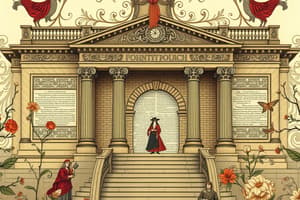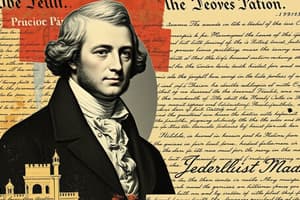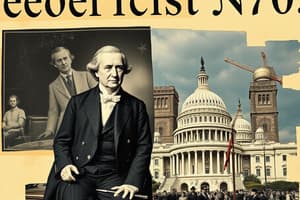Podcast
Questions and Answers
Which leaders represented the Federalist Party?
Which leaders represented the Federalist Party?
- Jackson and Clay
- Jefferson and Madison
- Hamilton and Adams (correct)
- Washington and Monroe
Republicans favored a loose interpretation of the Constitution.
Republicans favored a loose interpretation of the Constitution.
False (B)
Who were the primary supporters of the Federalist Party?
Who were the primary supporters of the Federalist Party?
Those in urban areas, the elite, and the wealthy.
Federalists supported a national bank, while republicans were __________.
Federalists supported a national bank, while republicans were __________.
Match the political party to their beliefs about federalism:
Match the political party to their beliefs about federalism:
Which of the following plans advocated for a strong national government during the Constitutional Convention?
Which of the following plans advocated for a strong national government during the Constitutional Convention?
The Alien and Sedition Acts were designed to protect the rights of foreign nationals in the United States.
The Alien and Sedition Acts were designed to protect the rights of foreign nationals in the United States.
What was the main goal of Alexander Hamilton's financial program?
What was the main goal of Alexander Hamilton's financial program?
The __________ was a significant event that demonstrated the federal government's ability to suppress civil disorder, occurring in 1794.
The __________ was a significant event that demonstrated the federal government's ability to suppress civil disorder, occurring in 1794.
Match the following historical figures with their roles:
Match the following historical figures with their roles:
Which of the following leaders is associated with the Federalist position?
Which of the following leaders is associated with the Federalist position?
Federalists favored a strict construction of the Constitution.
Federalists favored a strict construction of the Constitution.
What did Republicans fear in relation to government power?
What did Republicans fear in relation to government power?
The Federalists supported a strong _______ government.
The Federalists supported a strong _______ government.
Match the following ideological positions with their corresponding views on government structure:
Match the following ideological positions with their corresponding views on government structure:
Which of the following concerns led Federalists to advocate for a strong central government?
Which of the following concerns led Federalists to advocate for a strong central government?
The support base for Federalists mainly came from rural areas.
The support base for Federalists mainly came from rural areas.
Which two Founding Fathers are credited with leading the Republican party?
Which two Founding Fathers are credited with leading the Republican party?
Flashcards
Federalist Party
Federalist Party
A political party favoring a strong central government, a loose interpretation of the Constitution, and support for a national bank.
Democratic-Republican Party
Democratic-Republican Party
A political party advocating for limited federal power, a strict interpretation of the Constitution, and opposition to a national bank.
Loose Interpretation of the Constitution
Loose Interpretation of the Constitution
The Federalist Party believed in a broad interpretation of the Constitution, allowing the government to take actions not explicitly stated.
Strict Interpretation of the Constitution
Strict Interpretation of the Constitution
Signup and view all the flashcards
National Bank
National Bank
Signup and view all the flashcards
Federalism
Federalism
Signup and view all the flashcards
Republicanism
Republicanism
Signup and view all the flashcards
Loose Construction
Loose Construction
Signup and view all the flashcards
Strict Construction
Strict Construction
Signup and view all the flashcards
Federalists
Federalists
Signup and view all the flashcards
Republicans
Republicans
Signup and view all the flashcards
Tyranny
Tyranny
Signup and view all the flashcards
Anarchy
Anarchy
Signup and view all the flashcards
Whiskey Rebellion
Whiskey Rebellion
Signup and view all the flashcards
Alien and Sedition Acts
Alien and Sedition Acts
Signup and view all the flashcards
Jefferson's Agrarian Vision
Jefferson's Agrarian Vision
Signup and view all the flashcards
Revolution of 1800
Revolution of 1800
Signup and view all the flashcards
Study Notes
Overview of the First Two-Party System
- The Federalists and Republicans were the two dominant political parties during the early years of the United States.
- These factions held differing views on the structure and function of the federal government.
- Federalists advocated for a strong central government, while Republicans championed strong state governments.
- Differing interpretations of the Constitution led to disagreements about the extent of federal power.
Federalist Beliefs
- Strong Central Government: Federalists believed in a powerful central government to maintain order and stability.
- Loose Construction: They favored a broad interpretation of the Constitution, allowing the government flexibility to address new issues. This included implied powers.
- Pro-Business/Merchant Orientation: Federalists typically represented urban areas and business interests, often favouring policies that aided in their prosperity. Favoured more government involvement in the economy.
- National Bank Support: They supported a national bank, believing it was crucial for managing finances and promoting economic growth.
Republican Beliefs
- Strong State Governments: Republicans favoured autonomy for individual states and limited federal power.
- Strict Construction: They favoured a strict interpretation of the Constitution, believing that powers not explicitly granted to the federal government belonged to the states.
- Rural Orientation: They represented agricultural interests and agrarian values, largely found in rural communities. Opposed to government involvement in the economy; favoured laissez-faire.
- National Bank Opposition: They generally opposed a national bank, fearing it would centralize financial power and harm farmers.
Key Leaders
- Federalists: John Adams, Alexander Hamilton, George Washington
- Republicans: Thomas Jefferson, James Madison
Differing Ideological Issues
- Interpretation of the Constitution: Federalists and Republicans had contrasting interpretations of constitutional provisions, resulting in arguments about governmental powers, particularly those implied.
- Economic Policies: They disagreed on the role of government in the economy. Federalists advocated policies to promote industry and trade. Republicans favoured policies that supported farmers and agriculture, often favouring less government intervention.
Differing Support Bases
- Federalists: Wealthy urbanites and business constituents.
- Republicans: Farmers, agricultural workers, and rural communities.
Studying That Suits You
Use AI to generate personalized quizzes and flashcards to suit your learning preferences.




